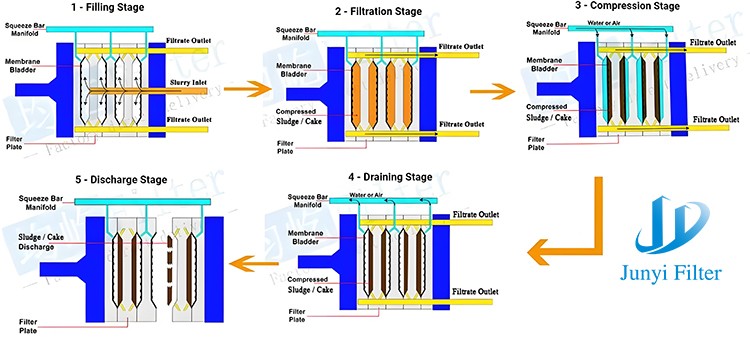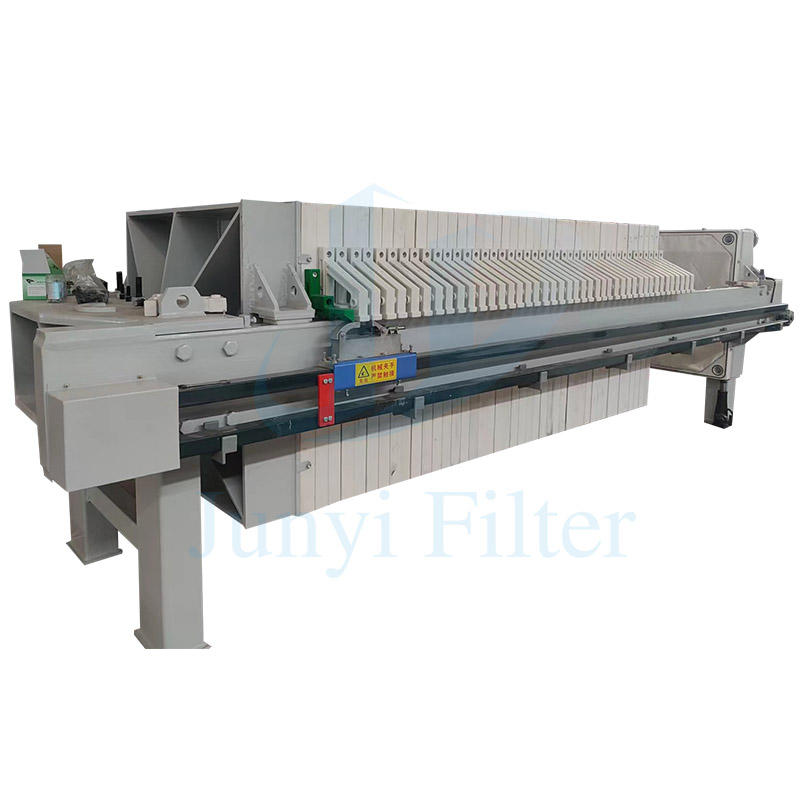High-Pressure Diaphragm Filter Press – Low Moisture Cake, Automated Sludge Dewatering
Product Introduction
The membrane filter press is an efficient solid-liquid separation equipment.
1.Environmental protection industry (wastewater treatment and sludge dewatering)
Municipal wastewater treatment plant:
Used for concentrating and dewatering sludge (such as activated sludge, digested sludge), it can reduce the moisture content from 98% to below 60%, making it easier for subsequent incineration or landfill.
Industrial wastewater treatment:
Dewatering treatment of high-moisture and high-pollutant sludges such as electroplating sludge, dyeing sludge, and papermaking sludge.
Separation of heavy metal precipitates from wastewater in the chemical industrial park.
River/lake dredging: The silt is rapidly dehydrated, reducing transportation and disposal costs.
Advantages:
✔ Low moisture content (up to 50%-60%) reduces disposal costs
✔ Corrosion-resistant design can handle acidic and alkaline sludge
2. Mining and Metallurgy Industry
Tailings treatment:
Dewatering of tailings slurry from iron ore, copper ore, gold ore and other mineral processing, to recover water resources and reduce the land occupation of tailings ponds.
Dewatering of concentrate:
Improving the grade of the concentrate (such as lead-zinc ore, bauxite) makes it easier to transport and smelt.
Metallurgical slag treatment:
Solid-liquid separation of waste slags such as steel slag and red mud, and recovery of useful metals.
Advantages:
✔ The high-pressure extrusion results in a filter cake with a moisture content as low as 15%-25%
✔ The wear-resistant filter plates are suitable for high-hardness minerals
3. Chemical Industry
Fine Chemicals:
Washing and dehydration of powders such as pigments (Titanium Dioxide, Iron Oxide), dyes, calcium carbonate, kaolin, etc.
Fertilizers and pesticides:
Separation and drying of crystalline products (such as ammonium sulfate, urea).
Petrochemical industry:
Catalyst recovery, oil sludge treatment (such as oil sludge from oil refineries).
Advantages:
✔ Acid and alkali resistant material (PP, rubber lined steel) suitable for corrosive media
✔ Closed operation reduces toxic gas emissions
4. Food and Biotechnology Engineering
Starch Processing:
Drying and washing of corn and potato starch, using alternative centrifuges to reduce energy consumption.
Brewing industry:
Separation of yeast, amino acids, and antibiotic mycelium.
Beverage production:
Pressing and dehydration of beer mash and fruit residues.
Advantages:
✔ Made of food-grade stainless steel or PP material, meeting hygiene standards
✔ Low-temperature dehydration retains active ingredients














